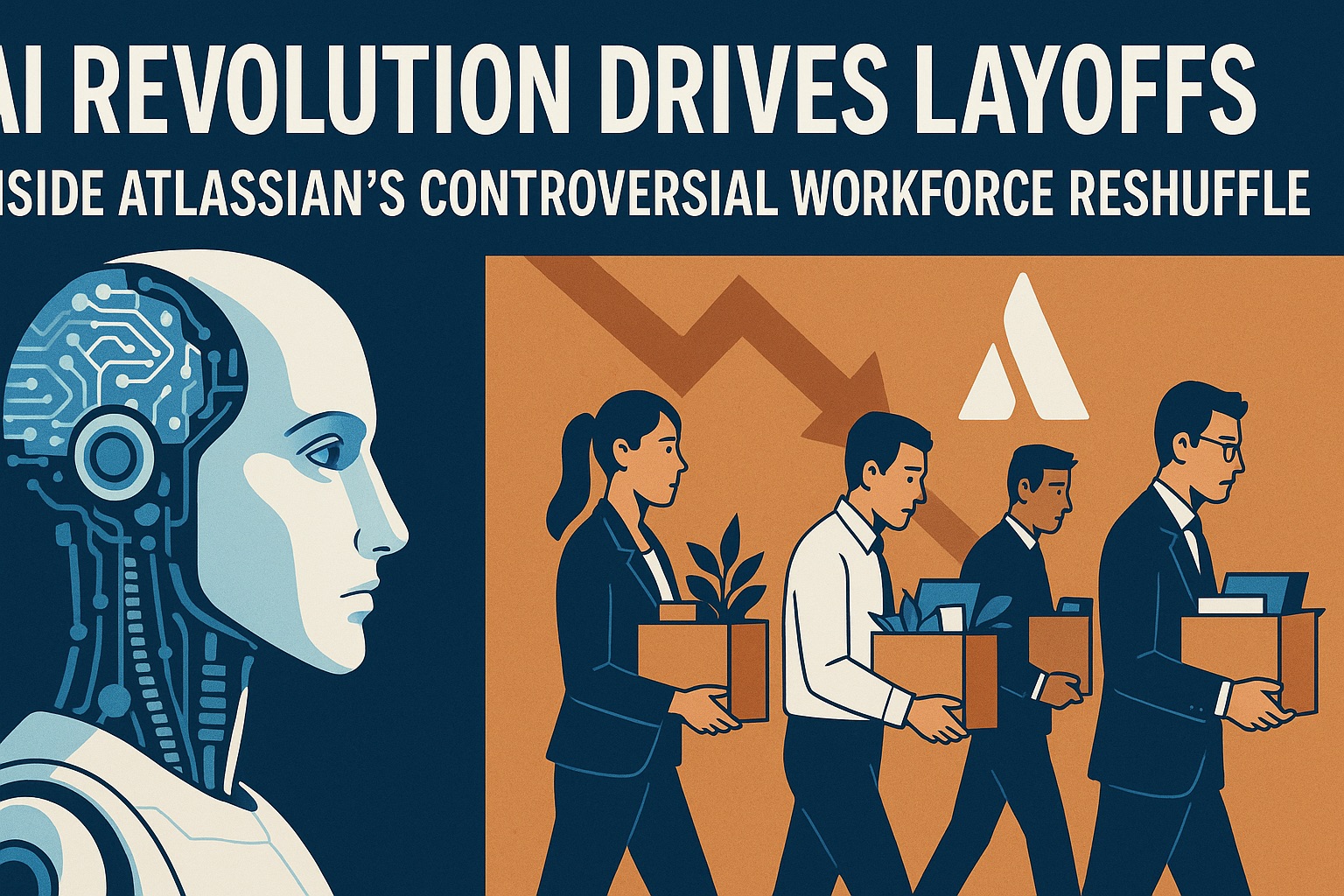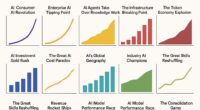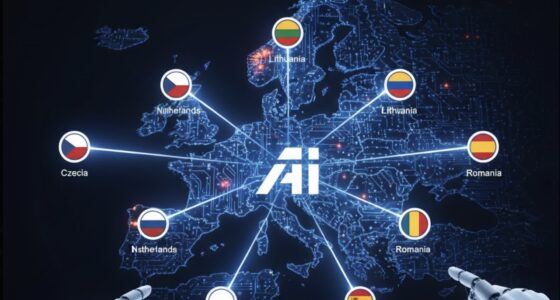The layoff that shocked tech workers
On 30 July 2025 Atlassian’s 12,000‑person workforce received a message that felt like science fiction. Chief executive Mike Cannon‑Brookes appeared on a prerecorded video titled “Restructuring the CSS Team: A Difficult Decision for Our Future” and announced that 150 customer support and service roles were being removedtechspot.com. Employees were told to wait 15 minutes to learn their fate; only then did personalised emails arrive informing staff whether they still had a jobtechspot.comcyberdaily.au. Those being let go had their laptops and company accounts locked immediatelytechspot.com. Atlassian pledged to pay the affected employees six months of salary, but legal and human‑resources experts criticised the impersonal nature of the announcement; HR Magazine’s Olive Turon argued that “one‑size‑fits‑all comms simply won’t cut it when people’s livelihoods are on the line” and called for compassion and supporttechspot.com. Employment solicitor Matthew Ottley warned that prerecorded redundancy messages could contravene fair‑process requirements in the U.K.techspot.com. Media reports suggested that many of the cuts hit the company’s European workforce, where labour laws are more oneroustechspot.com.
AI’s growing shadow over jobs
Atlassian told reporters that the layoffs were not directly replacing staff with artificial intelligence. A company statement said it had improved its customer‑experience tools and that this reduced the need for human support; customers would now be able to “self‑service through the embedding of AI in our contact form”, but the roles themselves were “not being replaced by AI”itpro.com. Nevertheless, the timing left little doubt about the direction of travel. The restructuring occurred as Atlassian unveiled new AI‑powered customer service solutions and as co‑founder Scott Farquhar delivered a speech at the National Press Club urging Australia to embrace AI. Farquhar told the audience that “every person should be using AI daily for as many things as they can” and argued that the technology will change the country’s economym.economictimes.com. His remarks mirrored Atlassian’s internal messaging: the cuts would improve customer experience and allow employees to focus on more complex work.
The juxtaposition of job cuts and AI investment is becoming common. Commonwealth Bank of Australia (CBA) recently announced that an AI chatbot had diverted some 2,000 calls per week from its contact centres. The bank made 45 Direct Banking workers redundant and planned to let go of another 45 customer messaging staffia.acs.org.au. A CBA spokesperson defended the decision, saying automation of simple queries allowed human teams “to focus on more complex customer queries that need empathy and experience”ia.acs.org.au. The Finance Sector Union criticised the move, insisting that workers want to be part of the change rather than replaced by itia.acs.org.au. Microsoft, meanwhile, had cut 15,300 jobs by July 2025 (including 9,000 in early July) even as its market value approached US$4 trillion. CEO Satya Nadella acknowledged the contradiction, saying that “by every objective measure, Microsoft is thriving… and yet, at the same time, we’ve undergone layoffs”windowscentral.com. He described this phenomenon as the “enigma of success” in an industry reshaping itself around AIwindowscentral.com.
Other firms also cited AI investment while shedding staff: Intuit cut 1,800 roles, Cisco eliminated 6,000 jobs, Dropbox removed 16 % of its workforce and Google axed 1,000 positions to reorient toward AI initiativesitpro.com. The pattern suggests an industry‑wide recalibration rather than an Atlassian‑specific misstep.
Investor reaction and executive optics
Market reaction to Atlassian’s announcement was swift. On 1 August 2025, the company’s Class A shares closed at $182.96, down $8.82 (4.60 %) from the previous daymarketbeat.com, with trading volume of roughly 1.94 million sharesmarketbeat.com. The stock marginally recovered in after‑hours trading but the decline underscored investor jitters about the layoffs’ impact on revenue growth and moralemarketbeat.com. Analysts on MarketBeat maintained a “Moderate Buy” rating with a long‑term price target around $274, but the short‑term sell‑off showed that cost‑cutting alone does not guarantee market confidencemarketbeat.com.
Public perception was further complicated by Cannon‑Brookes’ personal spending. In March 2025 he purchased a Bombardier 7500 jet costing roughly US$75 million. Facing criticism, he defended the purchase on LinkedIn as necessary for personal security and so he could run a global business while being a “present dad,” but he admitted feeling “a deep internal conflict” about owning the aircraftm.economictimes.com. As headlines about the layoff emerged, this luxury acquisition was cited by critics as evidence that leadership was prioritising personal convenience over staff welfarem.economictimes.com.
Atlassian’s position: efficiency and reskilling
Atlassian insists that its restructuring reflects improved efficiency rather than an AI‑driven culling of workers. Its statement emphasised that enhancements to product usability had reduced customer support needsitpro.com. By embedding AI into help portals, Atlassian aims to let customers resolve simpler issues on their own while human teams handle complex tasks. The company said affected employees would receive six months of pay and that staff across Australia, Canada, Germany, India, the U.K. and the U.S. were included in the cutsitpro.com. The approach aligns with a broader industry narrative: automation frees human workers for higher‑value tasks. However, as the CBA example shows, unions and employees remain sceptical of whether reskilling opportunities will materialiseia.acs.org.au.
The double‑edged sword of the AI revolution
The Atlassian episode encapsulates the tension between technological progress and corporate responsibility. Artificial intelligence promises enormous gains in productivity and cost reduction, and early evidence suggests that AI can reduce call‑centre wait times and fraud losses dramaticallyia.acs.org.au. Advocates like Farquhar argue that nations must embrace AI or risk falling behindm.economictimes.com. Yet the same technology can displace workers in roles once considered stable, and the way companies handle these transitions matters. Delivering termination notices via prerecorded videos may be efficient, but experts warn it undermines trust and may even breach employment lawtechspot.com. Add conspicuous executive wealth to the mix and the reputational damage escalates.
For investors and workers alike, the lesson is clear: AI adoption is not merely a technical upgrade but a social and ethical challenge. Companies like Atlassian must balance efficiency with empathy, ensuring that automation‑driven savings do not come at the expense of workplace dignity. Transparent communication, proactive reskilling and a willingness to share the gains of AI with employees will determine whether the technology fosters inclusive growth or exacerbates inequality. The AI revolution is underway, but its human impact is still being written.









